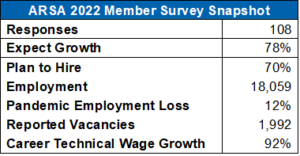ARSA Survey – Workforce Remains Top Concern
 ARSA’s 2022 member survey paints a picture of an industry slowly recovering from the pandemic but still suffering a severe labor shortage. In total, 108 member companies from around the world responded to the survey.
ARSA’s 2022 member survey paints a picture of an industry slowly recovering from the pandemic but still suffering a severe labor shortage. In total, 108 member companies from around the world responded to the survey.
Members are generally optimistic about business conditions: 78 percent believe revenues and markets will grow, nine percent expect no change, eight percent expect contraction and five percent don’t know. Repair stations plan to hire: 70 percent intend to add workers in 2022, 21 percent expect no change in workforce, two percent plan to eliminate positions, and six percent do not know their company plans.
Hiring will be a challenge because the industry workforce still has not recovered from the pandemic. U.S. survey respondents reported having a total of 20,527 employees on Jan. 1, 2020 (before the pandemic), 16,181 as of Jan. 1, 2021 (a 21 percent year-over-year drop) and 18,059 on Jan. 1, 2022. Taken together, those numbers validate ARSA’s earlier findings about job losses during the pandemic and suggest the industry’s workforce is still 12 percent smaller than it was pre-COVID.
U.S. companies reported 1,992 vacant technical positions, representing 11 percent of the survey respondent workforce. Projected across the entire U.S. repair station industry (which employs 182,000 Americans), there may be as many as 20,000 vacant technician jobs nationwide.
Not surprisingly “difficulty finding/retaining technical talent” was identified as the most significant threat to the industry and their companies (cited by 72 percent of respondents). Other issues of concern include overall economic uncertainty (52 percent), maintenance information availability (42 percent), regulatory costs/burdens (28 percent) and inconsistent enforcement/interpretation of aviation rules (27 percent).
The survey found the average hourly entry-level wage for technical personnel at U.S. repair stations was $19.16 per hour. Technicians with five years’ experience earn $26.50 per hour on average and more experienced technicians at “the top end” earn an average of $36.72 per hour.
Sixty-two percent of U.S. respondents have at least one foreign civil aviation authority (CAA) approval and, on average, 34 percent of gross revenues are associated with foreign certificates. This underscores the risk to U.S. companies should foreign CAA’s retaliate against potential congressional action limiting the use of foreign repair stations.
Repair stations don’t operate in a vacuum; they’re an important part of the fabric of the U.S. economy. Respondents reported having an average of 25 certificated vendors (the median was 13); 25 uncertificated vendors supporting maintenance (median: 5) and 54 vendors supporting general business operations (median: 9).
Respondents also reported a high level of satisfaction with the association. On a five-point scale (with five being “very satisfied”) the average score was 4.55. Here are some of the open-ended comments we received about the association and the value of membership:
- “A voice to speak on behalf of all repair stations is priceless.”
- “Always very helpful when I have regulatory questions.”
- “ARSA is consistent. There is a lot of inconsistency elsewhere these days.
- “ARSA was very helpful with the pandemic explanation detail with money and working with the US to get funds.”
- “ARSA works on issues that benefit us as well as the entire industry. They understand (and communicate) that the things we need will take years to achieve. It’s all about keeping the pressure on and engaging the system on topics that can generate results for the membership.”
- “Gives us confidence and peace of mind to have ARSA’s knowledge and history of backing small business’s especially regarding regulatory guidance and enforcement.”
- “Good support when needed, a positive organization for the industry with training and advocacy.”
- “Great resource.”
- “ARSA has a dynamic group that keeps it entertaining.”
- “ARSA’s impact over the years has been excellent. The expertise on the regulations has been unparalleled.”
- “You guys are awesome!”
Respondents said the most valuable member benefits were access to ARSA’s expertise (regulatory/legislative questions): 4.59/5 (5 = very important), regulatory compliance support (4.57), congressional advocacy (4.34), free regulatory compliance resources (4.32); and the Dispatch and hotline newsletters (4.19).
The data provided supports ARSA advocacy on the industry’s behalf and ensures that association resources are properly allocated. Thanks to all members who took the time to participate.








